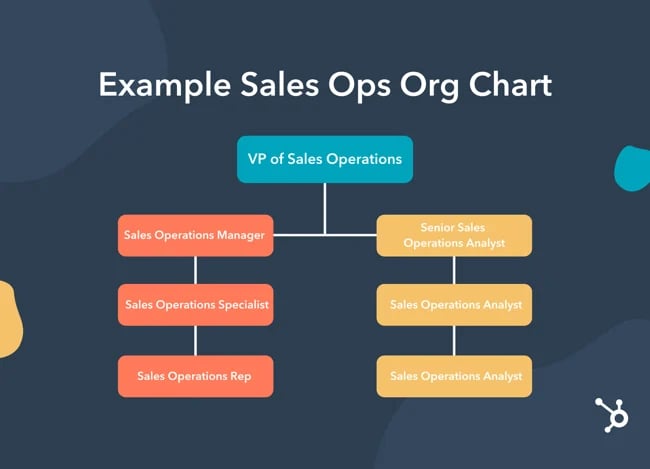Crew teams have coxswains — team members who sit in the stern of the boat, help steer its path, and direct the rhythm of the rowers. Without a coxswain, even the most incredible group of athletes won’t move as quickly, powerfully, or efficiently as they could.
The sales operations professional is like the coxswain for sales teams.
Channing Ferrer, VP of Sales Strategy and Operations at HubSpot, describes the role as a way to “plan, organize and enhance the sales organization in an effort to maximize productivity.”
In this guide, you'll get an introduction to sales operations, why it's a critical piece of your sales puzzle, and how to build your own sales ops team (or make your existing one stronger).
Download Our Free Sales Conversion Rate Calculator and Guide
Chapters
Sales Operations
Sales Operations is responsible for everything from lead management, sales strategy, and territory structuring and alignment to sales process optimization, compensation plans, sales automation, training, and data analytics and reporting.
What does sales operations do?
Sales Operations, or Sales Ops, reduces friction in your sales process so your salespeople are more productive and successful. This department handles anything and everything that helps your sales teams establish and maintain sustainable growth.
Here are a few examples of the day-to-day activities someone in a sales operations might do:
- Use data and reports to make decisions about bottlenecks in the sales process.
- Support sales teams in finding new leads and prospects.
- Implement sales technology and best practices.
Why do sales operations?
Sales operations professionals help sales teams perform better, hit goals faster, and lead smoother sales processes. Senior leaders and sales managers can leverage sales operations teams to synthesize data about the sales experience in order to make it more effective.
Sales Operations vs. Sales Enablement
Sales operations and sales enablement sound similar. Sales enablement is also working to improve sales productivity and boost revenue, so do you need both?
The short answer: Yes.
“I think of sales enablement as a component of sales ops,” says Ferrer. “Sales operations analyzes the data and makes decisions, and sales enablement helps roll out those decisions.”

Free Sales Plan Template
Outline your company's sales strategy in one simple, coherent sales plan.
- Target Market
- Prospecting Strategy
- Budget
- Goals
For example, Ferrer explains, sales ops might determine your salespeople are moving too quickly through the discovery stage of the sales process — and hurting close rates. Consequently, sales enablement would create sales training to help reps run a better discovery.
It’s also worth noting that sales enablement is usually more active earlier in the buyer’s journey, concentrating its energy on training and prospect education. Meanwhile, sales operations deals more with the negotiation and closing stages, along with high-level things like territory design and sales compensation.
To make sure your sales ops and sales enablement teams are complementing — not conflicting with — each other, we recommend creating a clear division of labor. Each department should have separate goals, deliverables, and key metrics. (We talk more about the sales operations team structure below.)
Periodically, ask both teams to sit down and discuss their ongoing projects to ensure they’re not duplicating efforts.
Sales Operations Roles and Responsibilities
- Cross-Functional Collaboration
- Sales Data Management
- Sales Forecasting
- Lead Generation
- Performance Management
- Sales Representative Support
- Sales Strategy
- Sales Team Communications
- Sales Team Organization
- Technology Management
- Territory Definition
- Training
The broader purpose of sales operations is to enhance the effectiveness, productivity, and business impact of your sales team. To achieve this, though, your sales ops department has many roles and responsibilities.
1. Cross-Functional Collaboration
Sales operations acts as an advocate for your sales team by playing a key role in sales and operations planning (S&OP), a business management process where leadership teams meet to ensure each business function is aligned.
2. Sales Data Management
Sales operations measures and evaluates sales data to determine the effectiveness of a product, sales process, or campaign. By doing so, sales operations can verify the success of a product or service or choose to implement a new sales plan or process if the data is reflecting otherwise.
Sales ops also uses internal performance data, along with external market and competitor research, to craft sales strategy and achieve sales goals.
3. Sales Forecasting
By studying and understanding past data and performance trends, sales operations can forecast future sales and report on future goals and needs. This is important as sales forecasts allow sales teams to spot potential issues while there's still time to avoid or fix them.
For example, let's say your sales operations team uses the length of sales cycle forecasting model. If they've identified your average sales cycle to take four months, and a salesperson has been working an account for one month, sales ops would forecast that salesperson is 25% likely to win the deal.
4. Lead Generation
Sales Operations handles administrative tasks like lead generation and appointment bookings with leads and contacts. They take care of this so that salespeople can focus on selling.
One way that your sales operations would do this is by ensuring strong sales and marketing alignment with an (SLA). An SLA helps answer questions and clarify communication around how sales teams can follow buyer personas, who on the sales team accepts marketing qualified leads, and where content like sales enablement lives.
5. Performance Management
Sales operations manages sales rep compensation plans and incentives. They also set rewards for superior performance and establish processes for acknowledging and resolving poor performance.
Moreover, sales operations may conduct regular sales performance reviews or coach sales managers on how to conduct proper reviews of their own. While your sales team works on growing your business, sales operations works on improving how you can do business better.
6. Sales Representative Support
Sales operations exists to make salespeople more efficient and impactful. They do this by providing leads, managing transactions, drawing up contracts, and providing training on time management skills.
Sales ops may also purchase tools to help ease the responsibilities of your sales team, such as HubSpot’s Sales CRM, Sales Hub.
7. Sales Strategy
Sales operations teams often use their data analysis and forecasting to establish a sales strategy and set future sales goals. The department is also responsible for building a sales process that improves conversions, shortens sales cycles, and maximizes sales wins.
8. Sales Team Communications
Sales operations is responsible for keeping the sales team aligned by reporting on sales and campaign results as well as communicating team news and sales wins.
The team may also do this by establishing communication channels, such as Slack or an internal wiki. Similarly, they may invest in a customer relationship management software (CRM) to help ease data and information sharing across your sales organization.
9. Sales Team Organization
Sales operations influences the structure and organization of the sales team to maximize its efficiency, impact, and performance.
For example, the sales ops team may notice some reps have strengths working with small business customers while others prefer to work with enterprise-level customers. Noticing this, sales ops may choose to reorganize the team so that every rep is working with the customers they prefer.
10. Technology Management
Sales operations oversees the implementation and use of technical tools and platforms, often in collaboration with the IT team, to make sales more efficient.

Free Sales Plan Template
Outline your company's sales strategy in one simple, coherent sales plan.
- Target Market
- Prospecting Strategy
- Budget
- Goals
11. Territory Definition
Sales operations is responsible for defining and assigning various sales territories to salespeople. This is an important responsibility as territories often determine sales reps' prospect options, available commission, and even work hours.
Given that sales ops also establishes sales strategy and compensation plans, they should also be in charge of territories.
12. Training
To build a successful sales team, sales operations assumes the responsibility of training new and current employees. Sales ops may also develop sales mentoring programs to maintain a strong team and build camaraderie.
These roles and responsibilities cannot be achieved without an effective sales operations team structure. We talk about this next.
Sales Operations Team Structure
With so many complex and critical responsibilities, forming the right team can make or break the impact of sales operations.
 Overall, sales ops team competencies can be put in two buckets:
Overall, sales ops team competencies can be put in two buckets:
- Tactical and support
- Strategy and design
Take a potential sales ops project: setting up and administering the company’s CRM. This calls for technical expertise, so it's important to find employees who have a strong operational mindset and are passionate about quality control.
But say your sales ops team needs to complete another challenge: optimizing the stages of your sales process. For this, you’ll need people who are skilled in seeing patterns in data and devising out-of-the-box solutions.
If you want to build a strong sales ops department, make sure you’re hiring people who satisfy both competencies — or multiple people who at least satisfy one or the other — all while remaining true to your mission statement.
Types of Sales Operations Jobs
A successful sales ops team structure includes a handful of different positions, all of whom play a very important role.
Sales Operations Representative
The sales operations representative position is an entry-level sales operations role. A rep should have 0-2 years of experience, excellent attention to detail, technical aptitude, strong communication skills, and familiarity with (or willingness to learn) marketing and sales automation.
Sales Operations Analyst
The sales operations analyst position requires more experience — typically, at least three years in a sales operations role. A sales ops analyst must be able to work across functions, including product, marketing, analytics, engineering, etc.
Problem-solving skills and a proactive work ethic are important, as well as data modeling, data mining, and data quality management experience. Advanced knowledge of Excel and business intelligence tools is also extremely valuable.
Senior Sales Operations Analyst
The senior sales operations analyst position calls for 4+ years’ experience. A senior analyst should be well-versed in CRMs, business intelligence platforms, data modeling, and Excel. In addition, they must have fantastic interpersonal and leadership skills and the ability to work with sales executives.
Manager of Sales Operations
Someone in a sales operations manager position typically supervises a team of sales operations specialists. For this reason, leadership experience and sales operations knowledge is important. An ideal candidate has 5+ years of experience. They should understand sales methodologies, what drives sales behavior, and how sales processes work. They should also be skilled in data modeling and analytics.
VP of Sales Operations (or Senior Director of Sales Operations)
The VP of sales operations position will manage a team and work closely with senior leadership. They should have at least 10 years’ experience in sales enablement and several successful leadership roles. An MBA or Masters in a technical field is usually required.
This person must understand how to use a CRM and sales automation tools and have the ability to develop complex financial and operational models using spreadsheets and database software. Presentation and communication skills are also critical.
As you build, expand, and strengthen your sales ops team, follow these best practices to ensure long-term value and impact.
Sales Ops Best Practices
- Define a sales operations mission statement.
- Actively collaborate with other teams.
- Establish strong leadership.
- Shadow the sales team.
- Introduce technology wisely.
- Don't hesitate to innovate.
1. Define a sales operations mission statement.
Aligning everyone on your sales ops team and broader sales team is crucial. Write a mission statement defining your objectives and purpose, then share it company-wide.
Sometimes, mission statements can be a little vague. One way to combat this is to outline a few ways that your team intends to meet its mission. At HubSpot, we call this our "How".
A few examples from this list include:
- "Automate operational tasks and challenge case queue with a new workload"
- "Produce high-quality output and see projects through to completion and enablement"
- "Prioritize our time for high business impact activities (long and short-term)"
A successful sales ops team defines their mission and sticks to it, especially when hiring and collaborating with other teams, such as sales enablement.
2. Actively collaborate with other teams.
Consistently check in with sales enablement, marketing, and sales to see whether you’re tackling the right work, addressing the important issues, and not re-doing anything that’s already been done. You should also hold periodic meetings. After all, sales operations is the sales team advocate.
“Have weekly meetings between your heads of marketing operations, demand generation, sales ops, and sales enablement,” Ferrer advises. “There are a lot of levers within sales and marketing ops that shift on a weekly or even daily basis. To ensure alignment, you want constant communication.”
3. Establish strong leadership.
Make sure sales operations is led by a vice president, director, or manager. This professional should report to the president, CEO, or COO — or, alternatively, a high-level sales leader. It’s important that sales ops has a relatively direct line to the executives.
Ferrer recommends having sales operations belong to sales rather than marketing.
“Although sales ops and marketing work closely together, it’s critical that sales ops really understands the overall sales strategy,” he says. “They need to be in the same department.”
4. Shadow the sales team.
Make it mandatory for members of your sales ops team to shadow salespeople once per quarter. This gives them the chance to witness first-hand the common challenges in sales, as well as see the impact their work can have. It also allows the two departments to forge a stronger connection.
5. Introduce technology wisely.
Use technology to automate as much as possible for salespeople. Not only do tedious manual processes take time away from selling, they’re also bad for morale and lead to expensive mistakes. This technology could include (CRM) software, email automation software, lead prioritization engines, or sales software.
On that note, use as many tools as you need — and no more. Technology can dramatically boost your sales team's efficiency, but not if they're toggling between 20-plus tools. Don't add a new one to their stack until you've figured out exactly what role it will play in their sales process and made sure they can easily and quickly implement and use it. If you force a cumbersome or overly complex toolkit on your reps, they'll simply refuse to adopt it.
6. Don't hesitate to innovate.
Sales operations should be continually innovating. A sales process should always be in flux as you learn new things about your prospects and customers, the market changes, and your products evolve.
Of course, you don't want to change it so frequently your salespeople get whiplash, but you should be making constant tweaks and updates to help them get the best results possible.
Hop Into Sales Ops
For almost 50 years, sales operations departments have been improving sales team efficiency and impact across the globe. What was once considered an auxiliary team is now a critical piece of the sales puzzle.
More than anything else, sales operations creates a system for selling. By leveraging data, insight, and technology, sales ops professionals drive strategy, performance, and sustainable growth.
Follow these tips to guide your sales team to success.
Editor's note: This post was originally published in August 2017 and has been updated for comprehensiveness.





.jpg)

![How to Develop a Strategic Plan for Business Development [Free Template]](https://blog.hubspot.com/hubfs/Copy of Featured Image Template Backgrounds-2.png)
.jpg)



